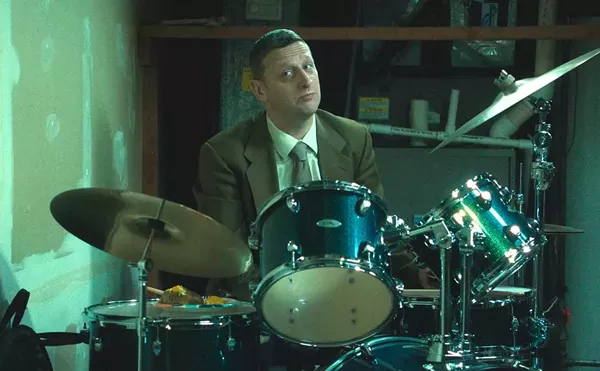
Audio By Carbonatix
[
{
"name": "GPT - Leaderboard - Inline - Content",
"component": "35519556",
"insertPoint": "5th",
"startingPoint": "3",
"requiredCountToDisplay": "3",
"maxInsertions": 100,
"adList": [
{
"adPreset": "LeaderboardInline"
}
]
}
]
It takes a special disposition to covet jeers more than applause, but to the indomitable and infamous Sheik, those beer-fueled hisses and boos were the sweet sound of money in the bank. A wrestling icon who thrived in the controlled chaos of the bloody and sweaty squared circle, the man known as the Sheik was a pioneer of mayhem, elevating his pseudo sport by getting as down and dirty as could be.
Back in the '60s and '70s, before the WWE's Vince McMahon Jr. revolutionized the industry with his glitzy brand of rock 'n' roll hype, 'roid rage and pyrotechnics from coast to coast, the pro wrestling biz was way more grungy and parochial. Competing syndicates carved the map into geographic territories, with cities and regions run like private fiefdoms. Few were as rowdy, raucous and profitable as Detroit's Big Time Wrestling promotion, packing rabid crowds into gyms, TV studios and Cobo Arena week after week for more than 20 years.
The Lansing-born son of Lebanese immigrants, Edward Farhat crafted the in-the-ring persona of an aristocratic Syrian Sheik, complete with a prayer rug, curved boots and a vicious rule-breaking brand of sadism that drove the fans wild ... with anger. A rude brawler, The Sheik preferred hitting opponents with chairs, blinding them with flashes of fire or jabbing them in the forehead with taped-up pencils, until they gushed blood.
He took on all comers, but his signature feud was with eternal foe Bobo Brazil, an African-American grappler as beloved as the Sheik was despised, and their battles for the U.S. Championship belt were always huge draws. The Sheik wasn't simply a local legend, he took his show on the road and his madman act played well, from Toronto to Tokyo. He died in 2003.
This documentary was made by super-fan Mark Nowotarski, who includes rare stills and videos he shot himself, alongside ample archive material. The film feels a bit like a late night infomercial as Nowotarski lines up a procession of hucksters, flunkies and advance men, layering on the ballyhoo, at first in glittery sprinkles, then later in batches of legend gloss so thick you could spread it with a trowel. While Farhat's talent and accomplishments are certainly worth touting, some of the superlatives heaped on him are borderline embarrassing. Farhat was a proud defender of "Kayfabe," the secret veil that supported the fictional storylines over the real scripted workings of the business, never breaking character outside the dressing room, or speaking English in public.
In burnishing the myth, the narrators completely sidestep the fact Farhat wasn't just the star but owned and ran the Detroit operation, and that by denying the fans justice, and keeping himself in the champion's spot for far too long, he helped drive the promotion into the ground. There's also the fact Farhat's gimmick of the evil Arabian stoked the fires of racial strife for box-office gain, a time-honored but dubious tradition in wrestling that gets brief lip service here.
What this doc peddles best is nostalgia, celebrating a freewheeling time when local media had breathing room to create. There's a delightful clip of the Sheik terrorizing Channel 7's afternoon housewife chitchat fest Kelly & Company, wreaking havoc, spouting gibberish and chasing host Marilyn Turner around the studio with a huge snake. Another delectable nugget comes from a much-hyped 1979 bout at the venerable Olympia Stadium with burly Dick The Bruiser defending the honor of Rock 'n' Roll, and with the Sheik bizarrely fighting for the superiority of disco, just to rile up the legions of kids who had joined FM rocker WRIF's "Disco Sucks" crusade. All of this paints a portrait of a more vibrant, diverse and infinitely funky era in Detroit's cultural life.
Premieres at the Motor City Comic Con, Friday through Sunday, May 14-16, at Rock Financial Showplace (46100 Grand River, Novi; 248-348-5600). For more info, go to motorcitycomiccon.com. It also screens Tuesday, May 18, at the Landmark Main Art Theatre, 118 N. Main St., Royal Oak; 248-263-2111. The 7 p.m. show includes performances by Detroit band Cinecyde and Lana of Detroit Bellydance.
Corey Hall writes about film for Metro Times. Send comments to letters@metrotimes.com.





